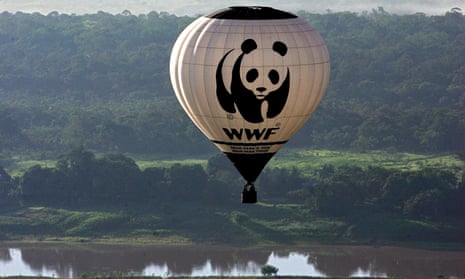World Wide Fund for Nature, put down your weapons. You are not a mercenary. You are not a government. You are not a terrorist. Your mission: to save the planet. Saving the planet does not happen by shooting people, or even by threatening them.
One might be forgiven for thinking that headlines this week revealing allegations that WWF was in bed with paramilitaries in different parts of the world must have been referring to the erstwhile World Wrestling Federation, not the fluffy panda charity that saves tigers. How could this possibly be?
Remove all rose-coloured glasses now. This isn’t the first time WWF has been caught up in a scandal, but it is possibly the most egregious. When I worked for WWF, albeit for a short time a decade ago, I had a nagging sense that things weren’t right. Conservation organisations do some great things – WWF included. But if the allegations are found to be true, then it seems there is a perception within that environmental rights have to trump human rights, regardless of the platitudes expressed in corporate leaflets.
Humans are the scourge that are killing rhinos, consuming too much stuff, burning down trees, polluting our rivers. All of this is true. We are nature’s enemy. And there is no doubt that trying to protect a large area of biodiverse rich land or rare species is complicated. But these claims allege that WWF has taken the solutions to combating nature’s enemy a tad too far.
When the independent taskforce that WWF has commissioned gets started, I hope their remit goes beyond the Buzzfeed exposé. Like other non-governmental organisations recently accused of wrongdoings, this is about more than safeguarding and a few “rogue” partners overstepping their boundaries.
The first thing the inquiry should focus on is power. Specifically, the power that comes from being a wealthy charity that raises money in the north and spends it in the south; the power of a macho culture with delusions of grandeur about saving the planet.
Such charities can come to believe that the cause is too important not to compromise on principles. This can lead to Faustian pacts with dictators, paramilitaries, corporations who themselves are probably a greater cause of climate change and environmental degradation than any of the poachers WWF is trying to stop.
Where should the investigation look? The structure, the leadership, money and organisational culture.
Accountability is another area that demands scrutiny. To whom does WWF answer? Right now, it’s the donors in the north, from large governments to wealthy individuals. Technocrats and strategists in Geneva, Washington and London implement tick-box exercises to satisfy donors and their corporate partners, to say they’ve consulted with local communities, but is there sufficient regard for how this has been done? Is there enough consideration for communities on their ancestral lands – people who may also want to protect the forests and the savannahs and the rivers?
Yet accountability is possible: in some countries, WWF has worked hand in hand with local communities, actively participating in their mission. This practice needs to become more widespread, and the inquiry needs to ask some tough questions. Ultimately, if organisations like WWF can’t be 360 degrees accountable, there is a question mark over whether they should even engage in a community or region at all.
If I were writing the terms of reference, the inquiry would also look at the role of the international NGOs writ large. Many have prospered by effectively stepping in where governments have failed. WWF knows why wildlife and natural systems are under threat. The real reasons are that people on the ground are poor and desperate, that we’re all consuming too much stuff; that an unjust economic system has put pressure on the planet’s resources. The organisation has invested in trying to unpack some of these longer-term issues to see what can be done.
In the 21st century, the role of NGOS should be to hold governments to account for their actions, not to pick up the pieces of state failures. I suspect the majority of conservationists do not feel comfortable having to negotiate with militias to save the rhinos. The mission seems to have spiralled out of control.
These organisations started off with good intentions, but their growth, power, culture and propensity to visions of grandeur are in danger of compromising the values and good intentions with which they started out. As the recent sexual abuse scandals revealed, Oxfam and others have compromised their values to “save lives” or “solve poverty”. Even Amnesty compromised its values to protect human rights – drawing criticism for its images of a semi-clad model lying on a bed of lifejackets to raise awareness of the refugee crisis.
Kudos to WWF for appointing an independent human rights investigation into these latest claims. But, if the allegations are true, please don’t just slap a few wrists and add in some extra safeguarding measures. That will do little to stem the tide of discontent and malfeasance across the sector. Use this as an opportunity to revolutionise what such organisations can be, so that they become a better version of what they are now.
